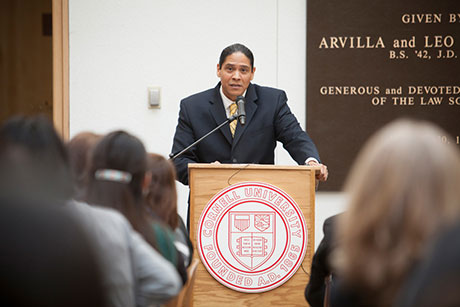Law School hosts Tribal Economic Development Summit
By Kenneth Berkowitz

With the traditional Haudenosaunee “Greetings to the Natural World,” the Native American Law Students Association (NALSA) opened its Tribal Economic Development Summit Feb. 28, welcoming attendees to Cornell Law School, Ithaca and the homelands of the Cayuga Nation.
Organized by Rose Nimkiins Petoskey ’15 and Nadine Michelle Thornton, J.D./MBA ’16, the program included panels on the opportunities and challenges of economic development in Indian country and a keynote by Jonodev Osceola Chaudhuri ’99, acting chairman of the National Indian Gaming Commission (NIGC).
“This was a nationally prominent group to represent the full range of potential economic development in Indian country,” said Gerald Torres, the Jane M.G. Foster Professor of Law, who moderated a panel on legal and financial perspectives, and serves as faculty adviser to NALSA. “At the same time, they represent a long tradition of Native American education at Cornell Law School, with alumni who are using the skills they acquired here to build a future for their tribes and communities, which we can all be justly proud of.”
Delivering the keynote, Chaudhuri (Muscogee Creek) talked about Indian gaming within the broader context of economic, political and cultural survival.
“For those tribes that engage in it, gaming is a means to an end: that end being the advancement of self-determination, of self-governance and ultimately of sovereignty,” said Chaudhuri, whose nomination to chair the NIGC is with the Senate Committee on Indian Affairs. “It’s a means to fight for and protect shared values, shared heritage and shared culture. But it’s not an end in itself, so I always try to tie gaming back to what’s important – just like when we were students here, we knew there were ultimately bigger battles to fight, and that what we were doing was a means to an end.”
For years, casinos seemed to be that long-awaited means for self-sufficiency, but the reality of Indian gaming has proven much more complicated, with some tribes failing in their efforts while others remain too far from major population centers to even risk trying. Most recently, in Carcieri v. Salazar (2008), the Supreme Court ruled against the Narragansetts, making it more difficult for the Department of the Interior to transfer land to tribal governments and re-emphasizing the need for tribes to find newer, more diverse, broad-based solutions.
“Before coming to Cornell Law, I had a feeling I could do little things to help, small volunteer projects on the reservation,” says Thornton (Cherokee), president of NALSA, who grew up near the Cheyenne River Indian Reservation in South Dakota. “Now I feel like I’m part of this group of thinkers who can really drive progress and make an impact on a broader scale. That’s what I wanted people to take away from the Summit: that we’re well-equipped to engage all the perspectives out there, tackle the tough issues, and make a difference.”
Four of the nine panelists were Law School alumni: Sharice Davids ’10, deputy director of the Thunder Valley Community Development Corp., which works to improve the lives of Lakota families and youth; David Johnson ’87, acting chief of the Division of Capital Investment in the Department of the Interior’s Office of Indian Energy and Economic Development; David Kimelberg ’98, CEO of Seneca Holdings, the investment arm of the Seneca Nation; and Dale White ’79, general counsel at Tarbell Management Group, based in Akwesasne Mohawk Territory.
The Tribal Economic Development Summit was co-sponsored by Dentons U.S.; the Office of the Dean of Students; Bank of America Merrill Lynch; Orrick, Herrington and Sutcliffe; the Graduate and Professional Student Assembly Finance Commission; the American Indian Program; and the Clarke Business Law Institute.
Kenneth Berkowitz is a writer for Cornell Law School.
Media Contact
Get Cornell news delivered right to your inbox.
Subscribe